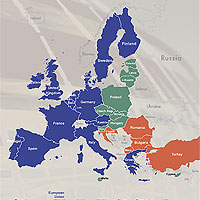Russian Foreign Ministry’s ombudsman slams EU’s human rights

(Interfax – December 17, 2012) The Russian Foreign Ministry’s ombudsman for human rights, Konstantin Dolgov, has criticized the human rights situation in the European Union. Dolgov was speaking at the Parliamentary Assembly of the Council of Europe (PACE) conference in Turin, as reported by the Russian news agency Interfax on 17 December.
Speaking about some EU countries’ involvement in the CIA’s programme on “secret prisons” for terrorism suspects, Dolgov said: “These activities are a deep violation of the basic international obligations in the field of human rights, above all, on the absolute ban on torture. Neither the relevant EU member countries (official investigations in these countries either end without explanation or become tangled or are not carried out at all) nor EU bodies, which refer to a lack of authority in the field, which pertains to the domestic jurisdiction of member countries.”
Dolgov went on to cite a study by the EU Agency on Fundamental Human Rights and said that violations and crimes in the anti-Semitism situation in the EU had increased substantially in the past 10 years.
Speaking about the Magnitskiy law, Dolgov said: “Currently, many of our partners are actively interested in the topic of the so-called Magnitskiy case. We have already repeatedly provided necessary explanations on the comprehensive measures that were taken in Russia in the course of removing problems in the penitentiary field. One gets the feeling that our partners are not especially interested in this. They are not interested in specific facts. Although if one talks about the specifics, about specific and verified evidence, then one can recall what is being committed in Europe.”
Dolgov said that the EU’s efforts in the fight against xenophobia and racism were not enough and were limited to moral condemnations by separate European Union officials.
“Against this background, Belgium, Greece, Spain, Poland and Estonia have not yet presented to the European Commission information on completing the framework decision of the European Union Council in 2008 on fighting certain forms and manifestations of racism and xenophobia through criminal law though the deadline of adopting necessary legislative measures expired at the end of 2010,” Dolgov said.
